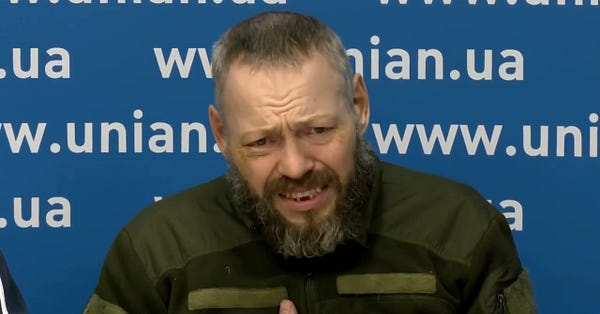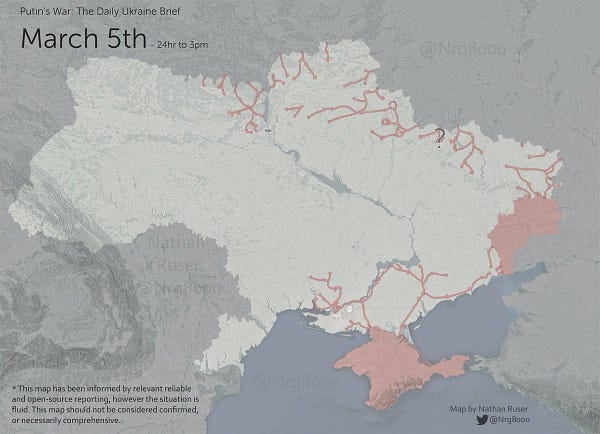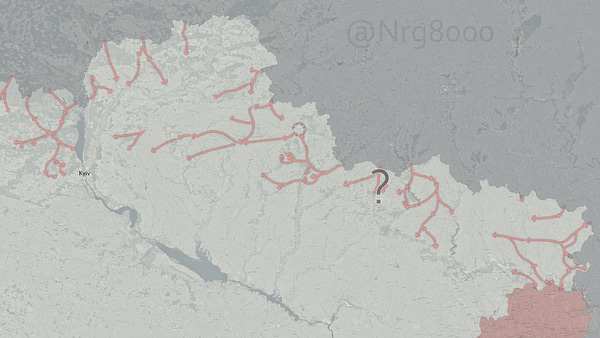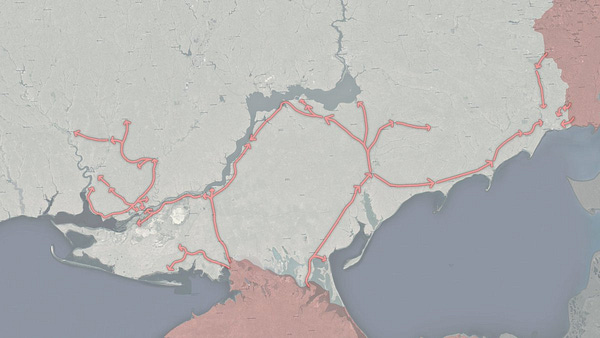The Guns of February
There’s no way to underscore just what an extraordinary moment we are living through, on so many levels.
What appears to be a Russian warplane after it was purportedly shot down by Ukrainian forces.
On February 24, 2022, the Russian Federation commenced an all-out invasion of Ukraine. It ran against my own predictions, where Russia would launch a limited offensive primarily to secure the eastern, largely pro-Russian areas of Ukraine and advance no further than the river Dnieper.
Instead, Russia, under the leadership of President Vladimir Putin, has gone for broke and seeks to take over the entire country. This is a shocking development, as Putin is putting his country’s long-term viability and his own legacy on the line in an attempt to take Ukraine.
There’s a lot to cover here, but before I go any further, I want to explain why I haven’t posted in well over a week. It feels like it’s been a lot longer than that, but such is the nature of things when events occur so quickly, you can’t keep up. The simple fact is, I’ve been at a loss for words. As such, I felt it more prudent of me to sit back, observe, and allow events unfold before speaking up on the matter (though I’ve shared some thoughts on social media). I’m not a professional writer, nor have I mastered the art of writing about current events in the moment, as they happen. There many out there more capable and talented in doing so, but, more important, I believe in allowing history to unfold before casting judgment. And yes, this is truly History in the making.
There’s no way to underscore just what an extraordinary moment we are living through, on so many levels. This is the sort of thing I learned about in school and read about in history books, but it was hard to believe I’d ever bear witness to such a thing in my lifetime. It proves, above all else, that history doesn’t move in a straight line and the existence I’ve been blessed to live for most of my life was, unfortunately, an aberration. I don’t know what the future holds, but what I do know is that the world I once knew is truly lost and gone forever.
Back to the matter at hand. First, it’s important to establish some background facts. Though most the public sees this as the outbreak of a brand-new war, the reality is, the 2022 Russian invasion of Ukraine is merely the latest chapter in Russo-Ukrainian armed conflict which started, coincidentally, February 2014 and was limited to Crimea and the Donbas region in Ukraine’s east. The two sides have been fighting a limited war since then, making Russia’s recent actions a major escalation of an already-existing conflict. In many ways, it was likely, if not inevitable, we would see this day come. After all, this isn’t the first time Russia an Ukraine have fought - 100 years ago, after four years of fighting, the newly-formed Soviet Union made parts of Ukraine a member state of the Socialist Republic. As the saying goes, history may not repeat itself, but it certainly rhymes.
The course of the conflict currently remains unclear. It’s difficult to obtain reliable information on the war because both sides have an interest in either keeping the true nature events obscured or spun in their favor. The most prominent example concerns casualties. At one point, official Ukraine sources were claiming the Russians had suffered 8,000 casualties despite the war not even being two days old. The conflict is arguably the most high-intensity conflict we’ve seen in decades, but Ukraine inflicting that kind of damage on the Russians is virtually impossible, given the manner in which the war has been fought and the fact that not enough time has passed for that kind of damage to have been dealt.
The Ukrainians, despite being Western-armed and Western-trained, are outgunned and outnumbered. The Russians, despite seeming rather unimpressive so far, aren’t waging war old-fashioned style, with frontal assaults against enemy strongholds with waves of men and machines. The type of war being fought is far more sophisticated than that, even if it pales in comparison to the kind of war waged by advanced militaries like that of the U.S. Put simply, neither the Russians nor Ukrainians are fighting in a fashion that’d facilitate the kind of killing we’d have seen during the two world wars or even our own American Civil War. It’s also worth noting that Russia, until almost a week into the war, hadn’t deployed anywhere close to the full spread of the entire force arrayed against Ukraine, meaning that the Russian forces at the front couldn’t sustain such heavy losses in a short period of time.
The point is that there’s so much about this war we don’t know and won’t know for a long time. The fog of war is a very real phenomenon, but, ironically, in an age of readily-available, ubiquitous information, it’s still difficult to parse fact from fiction. This is yet another reason why I was at a loss for words - even the war as a whole felt “kayfabe” at times. The Ukrainian fighter pilot with six Russian kills in just a few days of fighting? The Legend of Snake Island, where a defiant group of Ukrainian troops were, tragically, obliterated? All of it sounded to be too good to be true and it was. Even this video of a captured Russian troops denouncing their own government is highly suspect:


For now, the defining characteristic of the Russo-Ukrainian war hasn’t been the employed arsenals and battles, but the information war all sides are employing. It is a real-time exhibition of how propaganda works, especially during a war. Again, this is why I’ve found it so hard to say anything up to this point, because I’m not sure if what I say today will hold up half a day from now.
One thing I’m fairly confident of - whatever difficulties the Russians are encountering, the Ukrainians have it far worse. No matter how many losses the Russians have suffered, they’re still managing to make a lot of progress in a short timeframe. Mind you, Ukraine is a country the size of Texas:




This is the significance of the information war. Ukraine needs to motivate its own population and attempt to demoralize the enemy’s population by claiming to be holding out against the vicious bear, while also trying to bring the NATO into the conflict. It’s a delicate balancing act: the more Ukraine seems to hold out against Russia, the more foreign support they’ll receive, but the less incentive there is for NATO to directly intervene. At the same time, NATO doesn’t want to get directly involved in the war, either, no matter how Ukraine fares. But, if Ukraine does fall to Russia, this would be a devastating loss for NATO, even if Ukraine isn’t part of the alliance. An assumption underpinning the “liberal world order” post-Soviet collapse was that the thing that just happened to Ukraine would never happen in the presence of multinational institutions like NATO, the EU, or the UN. Yet, here we are.
Which brings us to the question on the minds of so many - will we see an expansion of this conflict? Will the U.S. and NATO get directly involved in Ukraine? There are two things to keep in mind.
First, whatever the U.S. says aloud, it’s likely the U.S. has a different take behind closed doors. I don’t believe anyone in the Defense or State Departments, or even within President Joe Biden’s circle, honestly believes this war is going well for Ukraine.
Second, as much as I malign the authorities here, I also don’t believe them to be irrational. That is, they are political animals and are fully aware of the costs associated with pursuing a certain policy or tack. Look at how the COVID pandemic has effectively ended, at least as a political issue. This is what happens when your approval ratings hit bottom - you’ll sacrifice your sacred cows if it means a chance at winning the next election.
My point is that all the talk of a no-fly zone in Ukraine, no matter how raucous, will likely not come to pass, as it would surely escalate the crisis and dramatically heighten the risk of a direct military confrontation between NATO and Russia. This isn’t the sort of thing you do even when the political winds are blowing in your favor. This is also not something you do when the cost of food, fuel (gas is $6.00/gallon at its cheapest where I live), and housing is rising without any relief in sight, much of it impacted by the situation in Ukraine.
There’s a lot more I could say about the situation and a lot more I wish I could say. For now, I’ll conclude by saying the war isn’t going in Ukraine’s favor, we’ve entered a dangerous new period of hostile relations with Russia, and, even though Ukraine’s fate won’t affect America’s fate, the second- and third-order effects of the war will impact America’s status as a superpower. I wrote before about how the U.S. empire may be in its twilight and that this country, as we’ve known it our entire lives, may be no more by the end of this decade.
It’s still too early to say if this prediction will pan out. But it’s not looking good. After a long break from History, it’s returned with a vengeance.
Max Remington writes about armed conflict and prepping. Follow him on Twitter at @AgentMax90.
If you liked this post from We're Not At the End, But You Can See It From Here, why not share? If you’re a first-time visitor, please consider subscribing!



